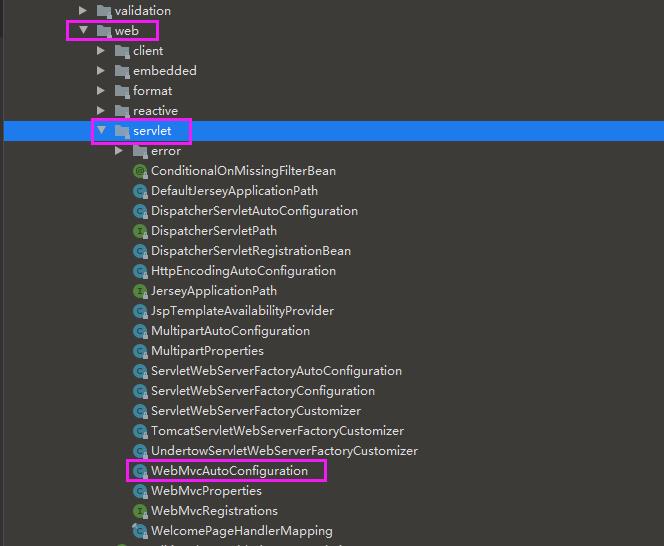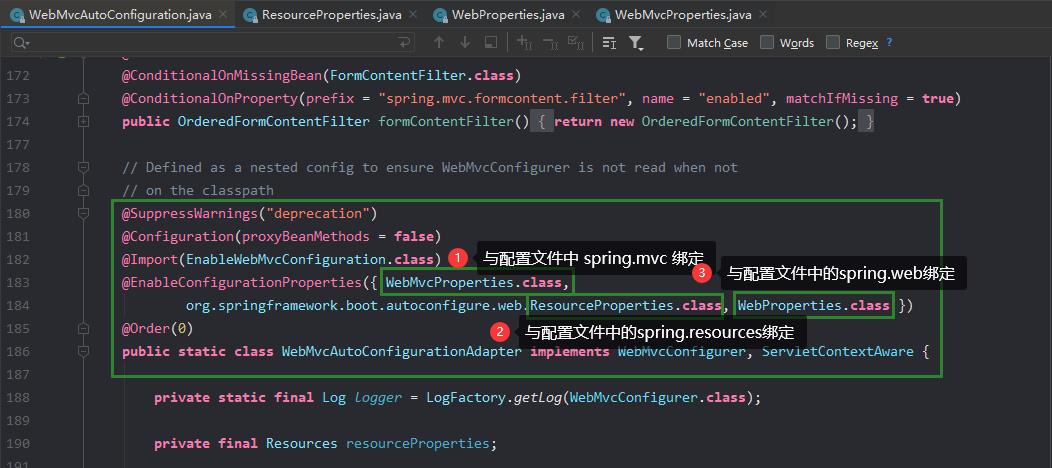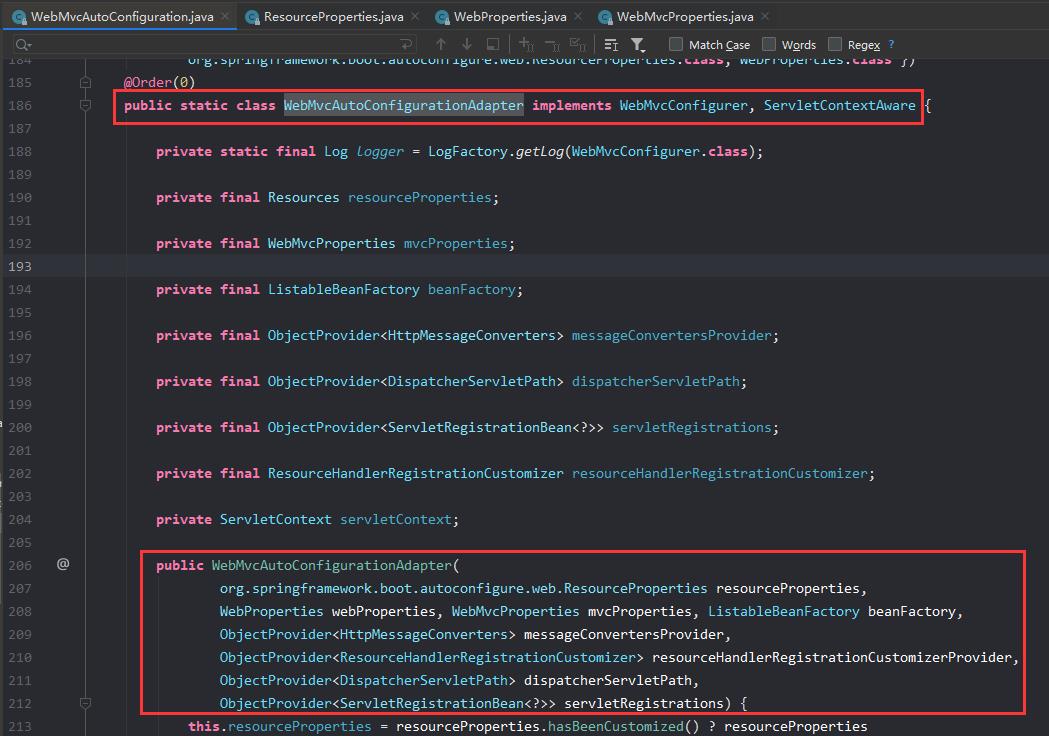九SpringBoot2核心技术——web开发(静态资源配置原理)
Posted 上善若水
tags:
篇首语:本文由小常识网(cha138.com)小编为大家整理,主要介绍了九SpringBoot2核心技术——web开发(静态资源配置原理)相关的知识,希望对你有一定的参考价值。
一、静态资源配置原理
- SpringBoot启动时,默认加载 xxxAutoConfiguration 类 (自动配置类)

- SpringMVC功能的自动配置类 WebMvcAutoConfiguration,生效。

@Configuration(proxyBeanMethods = false)
@ConditionalOnWebApplication(type = Type.SERVLET)
@ConditionalOnClass({ Servlet.class, DispatcherServlet.class, WebMvcConfigurer.class })
@ConditionalOnMissingBean(WebMvcConfigurationSupport.class)
@AutoConfigureOrder(Ordered.HIGHEST_PRECEDENCE + 10)
@AutoConfigureAfter({ DispatcherServletAutoConfiguration.class, TaskExecutionAutoConfiguration.class,
ValidationAutoConfiguration.class })
public class WebMvcAutoConfiguration {
...
}
- 给容器中配了什么?
// Defined as a nested config to ensure WebMvcConfigurer is not read when not
// on the classpath
@SuppressWarnings("deprecation")
@Configuration(proxyBeanMethods = false)
@Import(EnableWebMvcConfiguration.class)
@EnableConfigurationProperties({ WebMvcProperties.class,
org.springframework.boot.autoconfigure.web.ResourceProperties.class, WebProperties.class })
@Order(0)
public static class WebMvcAutoConfigurationAdapter implements WebMvcConfigurer, ServletContextAware {
...
}
- 配置文件的相关属性和xxx进行 了绑定。
WebMvcProperties ——> spring.mvc
WebProperties ——> spring.web
ResourceProperties ——> spring.resources

1.1、配置类只有一个有参构造器
类:org.springframework.boot.autoconfigure.web.servlet.WebMvcAutoConfiguration.WebMvcAutoConfigurationAdapter 只有一个有参构造器

/**
有参构造器所有参数的值都会从容器中确定
ResourceProperties resourceProperties 获取和spring.resources绑定的所有值的对象
WebProperties webProperties 获取和spring.web绑定的所有值的对象
WebMvcProperties mvcProperties 获取和spring.mvc绑定的所有值的对象
ListableBeanFactory beanFactory spring的beanFactory
HttpMessageConverters 找到所有的HttpMessageConverters
ResourceHandlerRegistrationCustomizer 找到资源处理器的自定义器
DispatcherServletPath
ServletRegistrationBean 给应用注册Servlet、Filter...
*/
public WebMvcAutoConfigurationAdapter(
org.springframework.boot.autoconfigure.web.ResourceProperties resourceProperties,
WebProperties webProperties, WebMvcProperties mvcProperties, ListableBeanFactory beanFactory,
ObjectProvider<HttpMessageConverters> messageConvertersProvider,
ObjectProvider<ResourceHandlerRegistrationCustomizer> resourceHandlerRegistrationCustomizerProvider,
ObjectProvider<DispatcherServletPath> dispatcherServletPath,
ObjectProvider<ServletRegistrationBean<?>> servletRegistrations) {
this.resourceProperties = resourceProperties.hasBeenCustomized() ? resourceProperties
: webProperties.getResources();
this.mvcProperties = mvcProperties;
this.beanFactory = beanFactory;
this.messageConvertersProvider = messageConvertersProvider;
this.resourceHandlerRegistrationCustomizer = resourceHandlerRegistrationCustomizerProvider.getIfAvailable();
this.dispatcherServletPath = dispatcherServletPath;
this.servletRegistrations = servletRegistrations;
this.mvcProperties.checkConfiguration();
}
1.2、资源处理的默认规则
@Override
public void addResourceHandlers(ResourceHandlerRegistry registry) {
if (!this.resourceProperties.isAddMappings()) {
logger.debug("Default resource handling disabled");
return;
}
addResourceHandler(registry, "/webjars/**", "classpath:/META-INF/resources/webjars/");
addResourceHandler(registry, this.mvcProperties.getStaticPathPattern(), (registration) -> {
registration.addResourceLocations(this.resourceProperties.getStaticLocations());
if (this.servletContext != null) {
ServletContextResource resource = new ServletContextResource(this.servletContext, SERVLET_LOCATION);
registration.addResourceLocations(resource);
}
});
}
src/main/resources/application.yml
server:
port: 8888
spring:
web:
resources:
add-mappings: false # 禁用所有静态资源规则
// org.springframework.boot.autoconfigure.web.WebProperties 类下的静态内部类
public static class Resources {
private static final String[] CLASSPATH_RESOURCE_LOCATIONS = { "classpath:/META-INF/resources/",
"classpath:/resources/", "classpath:/static/", "classpath:/public/" };
/**
* Locations of static resources. Defaults to classpath:[/META-INF/resources/,
* /resources/, /static/, /public/].
*/
private String[] staticLocations = CLASSPATH_RESOURCE_LOCATIONS;
...
}
1.3、欢迎页的处理规则
@Bean
public WelcomePageHandlerMapping welcomePageHandlerMapping(ApplicationContext applicationContext,
FormattingConversionService mvcConversionService, ResourceUrlProvider mvcResourceUrlProvider) {
WelcomePageHandlerMapping welcomePageHandlerMapping = new WelcomePageHandlerMapping(
new TemplateAvailabilityProviders(applicationContext), applicationContext, getWelcomePage(),
this.mvcProperties.getStaticPathPattern());
welcomePageHandlerMapping.setInterceptors(getInterceptors(mvcConversionService, mvcResourceUrlProvider));
welcomePageHandlerMapping.setCorsConfigurations(getCorsConfigurations());
return welcomePageHandlerMapping;
}
# --------->
WelcomePageHandlerMapping(TemplateAvailabilityProviders templateAvailabilityProviders,
ApplicationContext applicationContext, Resource welcomePage, String staticPathPattern) {
if (welcomePage != null && "/**".equals(staticPathPattern)) {
logger.info("Adding welcome page: " + welcomePage);
setRootViewName("forward:index.html");
}
else if (welcomeTemplateExists(templateAvailabilityProviders, applicationContext)) {
logger.info("Adding welcome page template: index");
setRootViewName("index");
}
}
以上是关于九SpringBoot2核心技术——web开发(静态资源配置原理)的主要内容,如果未能解决你的问题,请参考以下文章
八SpringBoot2核心技术——web开发(静态资源访问)
八SpringBoot2核心技术——web开发(静态资源访问)
十SpringBoot2核心技术——web开发(请求参数处理)
十SpringBoot2核心技术——web开发(请求参数处理)